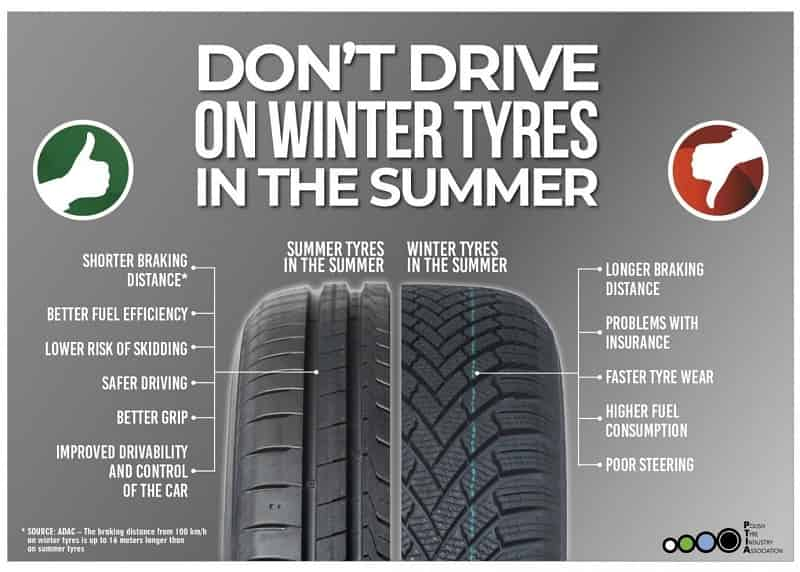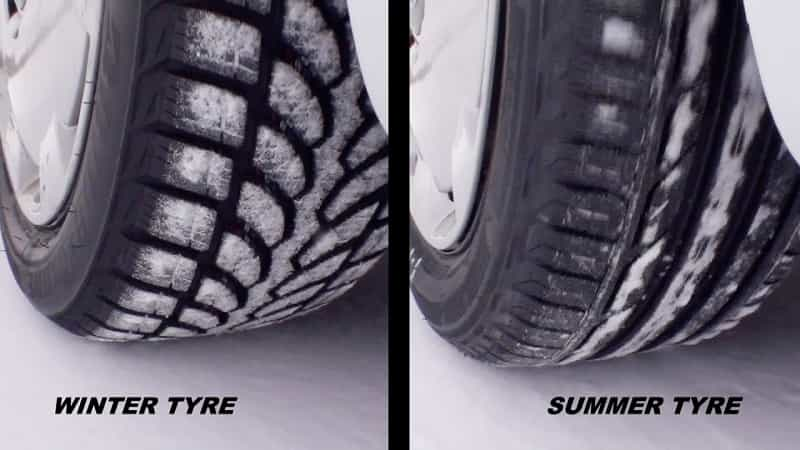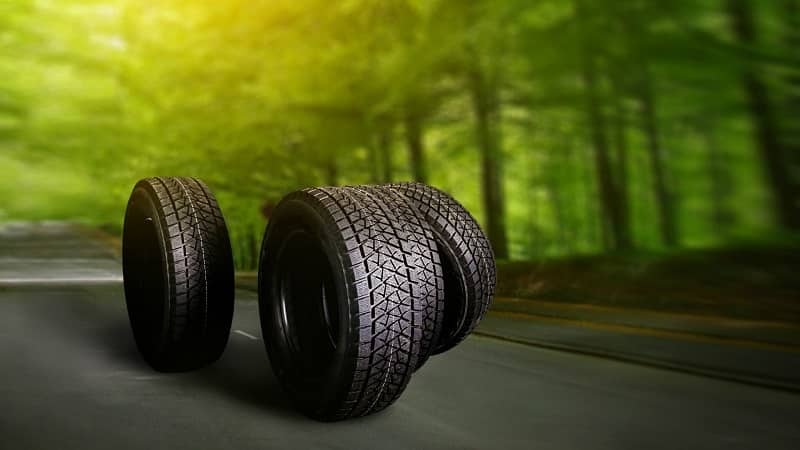There are many reasons winter tires are so indispensable in harsh winter conditions. They come with special flexible rubber compounds and unique tread patterns that ensure optimal grip in snow and ice conditions. They work best at low temperatures and in the presence of winter precipitation. It ensures maximum reliability and safety for motorists in potentially dangerous situations.
What makes them disadvantageous when temperatures rise? In fact, on a dry road without ice or snow, there is no need to use tires with protruding edges that generate traction on the road surface. So can I use winter tires in the summer?

Do not drive on winter tires in the summer
Contents
Winter Tires in Summer: Why Shouldn't You?
The winter tires have characteristics, structure, and mix that are perfect for the coldest season of the year. You can drive your vehicle with confidence on ice and snow. The softer compound used in summer with high temperatures would wear badly and much faster.
They would lose all the properties of thermal tires. The motorist will find himself with tires that are inefficient at low temperatures. There is a worn tread that cannot expel snow and slush from the tread.
Therefore, keeping winter tires in summer is not correct and does not allow us to save money. It will be necessary to buy a new set of winter tires that guarantee safe driving in winter at low temperatures. Therefore, we advise not to equip snow tires in summer to gain safety and save an additional tire change.
Can Winter Tires Be Used in the Summer?
The summer tires have a different compound, resistant to high temperatures. For this reason, starting from spring this type of tires are mounted on your car, which guarantees optimal road holding even with high temperatures, being made with a harder and more resistant mixture.

Winter tire Vs. Summer tire
Winter tires have a soft compound. They adhere to the ground even in sub-zero temperatures. For this reason, the winter tires with the tropical climate have the risks of becoming too soft, wearing out quickly, and failing to guarantee good road holding during the summer. The steering response is slower and the braking distance is greater.
It is not an excellent solution, even if some drivers fit only two summer tires. Indeed, this practice could even be the worst alternative because the response of the two axes is different and not at all balanced.
The first thing to clarify is that each of us should recognize a summer tire from a winter one. Unfortunately, half of the motorists still cannot make this distinction. Just pay attention to the grooves of the tires, arranged differently on two models of tires. The tread surface is different. It is siped in the blocks, used to ensure grip on snow and ice.
The Highway Code does not prohibit driving with winter tires all year round. Winter or four-season tires may also be suitable in summer if they have a speed code equal to or greater than the one stated in the vehicle registration document.
For driving in winter, winter tires can also have a lower speed index than what we stated in the vehicle registration document, as long as this index is not lower than Q (Q - speed ratings with up to 160 km/h). For safety reasons, it is advisable to always use the most suitable tires for the period.
Reasons Not to Drive Winter Tires in Summer
1. Winter tires are not suitable for hot asphalt road
The soft tread of a winter tire wears much faster when used on hot asphalt. It is precisely the rubber compound that is planned to remain soft at temperatures below 7 degrees Celsius. This material effectively reduces the negative impact of low temperatures and ensures high traction in winter conditions.
But if you fit a set of winter tires for the entire year, the tire wears much faster because of this flexibility. In the presence of higher temperatures, we can reduce the service life by as much as 60%. There is a high probability that you will have to change tires much sooner than it would have been if you had fitted summer tires in early spring.
Our advice for the warm months is to use All-Season or Summer tires that come with a different rubber compound to withstand the highest temperatures. As you have surely thought, the compounds used for summer tires quickly become harder and more brittle when used in winter conditions.

2. Fuel consumption is no longer optimal
Another thing to know if you decide to use winter tires even in the summer is that you will end up spending more on fuel.
On hot asphalt, the rolling resistance of winter tires is higher than summer or all-season tires. It is because the softer rubber compound deforms more, rolling resistance increases as does fuel consumption, forcing you to refuel more frequently than necessary.
Driving with winter tires in the summer also has negative effects on the environment and quality of life. By consuming more fuel, the car emits more carbon dioxide. It is noisier, and the journey becomes less comfortable.
3. Effects on handling and safety
If all-season or summer tires are not fitted during hot weather, the car cannot guarantee optimum handling and safety, especially when you are forced to make sudden turns.
Imagine having to perform an emergency maneuver. Winter tires are too soft for a dry road surface. The car will not respond to the maneuver in a manner appropriate to a critical situation like this.
In addition, the stopping distance increases considerably. Many tests have shown that driving with winter tires in summer increases the braking distance by at least 10% in dry conditions and 26% in wet conditions.
In the long term, winter tires left on all spring, summer, and autumn until the following winter will most likely have worn-out knobs because of the softer compound. The reduced tread depth will prevent winter tires from providing grip and traction on surfaces covered with snow and ice. It is a big problem to drive safely.
Frequently Asked Questions
1. What are the specific characteristics of winter tires?
Compared to summer tires, winter tires have a rubber compound that can keep softness at low temperatures. In addition, winter tires have deeper cutouts for optimal performance in cold conditions (dry or snowy).
Special markings can identify these tires such as the M+S or 3PMSF logo. Tires marked M+S are tires that are not involved in any required performance testing. Therefore, there is no guarantee of performance for tires marked M+S.
In contrast, tires marked 3PMSF (3 Peak Mountain Snowflake) are winter tires that have been certified through regulatory testing to ensure an appropriate level of performance in winter conditions. Famous car tire company Michelin recommends using 3PMSF tires in the winter.
2. What is the suitable weather for using winter tires?
Winter tires should be installed on your vehicle as soon as the temperature drops below 7 degrees Celsius. This temperature usually occurs from mid-October to mid-April, depending on the weather.
3. What is the suitable weather for running summer tires?
Summer tires ensure maximum safety performance in conditions above 7 degrees Celsius. The compounds and design of these tires allow for good grip and handling on both dry and wet surfaces in warmer conditions. In addition, summer tires also offer longer life, better fuel economy, and comfort than winter tires.
4. Is it recommended for all wheels?
The last note when choosing winter tires is to remember to equip all vehicles with the same type to ensure balance for the vehicle.
I’m Ivo Gievski, the content writer for Tireer. We built our website with over 15 years of experience and extensive research in the automotive and technology sectors. My dedication to delivering high-quality content is unwavering, and I strive to continuously hone my skills to stay ahead of industry trends and provide readers with informative, engaging, and valuable insights.